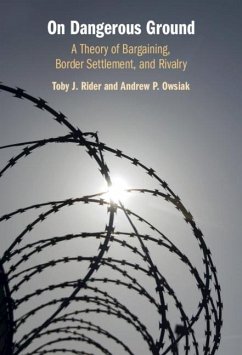As a rule, countries consider clearly defined international borders to be paramount for their survival and prosperity. Most borders gain definition peacefully and, once they do, these definitions stick (i.e., the border remains settled). The failure to define borders, however, produces protracted, geopolitical, militarized competitions (or rivalries) between neighboring countries. Rider and Owsiak model this failure as a particular type of bargaining problem - namely, bargaining over territory that affects the distribution of power between neighbouring states significantly - that undermines efforts to resolve border disagreements peacefully. Countries must then overcome this bargaining problem or risk falling into a protracted rivalry, which then needs to be addressed with more resources. The authors develop a theory of how borders settle. They then explore the consequences of the failure to settle, theoretically connecting it to the onset of rivalries. This leads to the process that helps rivals overcome the bargaining problem, resolve their border disagreement, and terminate their rivalry.
Dieser Download kann aus rechtlichen Gründen nur mit Rechnungsadresse in A, B, BG, CY, CZ, D, DK, EW, E, FIN, F, GR, HR, H, IRL, I, LT, L, LR, M, NL, PL, P, R, S, SLO, SK ausgeliefert werden.









